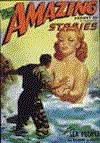|
|
|
'Mission to Mars' is lost in space
March 23, 2000 By Franklin Harris In the hands of any other director, "Mission to Mars" might have been a successful film. But in the hands of Brian De Palma, ("Carrie") it is a sentimental mess. Ironically, one of the directors who might have made "Mission to Mars" work is -- Brian De Palma. De Palma made his name by ripping off Alfred Hitchcock in films like "Dressed to Kill," which is almost a plagiarism of "Psycho." In Hitchcock mode, De Palma might have turned "Mission to Mars" into the first great science fiction film of the 2000s. Unfortunately, De Palma has found other directors to steal from. In "Mission to Mars," he swipes heavily from Stanley Kubrick and Steven Spielberg and adds healthy doses of "Forbidden Planet," "The Abyss" and even "The X-Files" for good measure. Unfortunately, the whole is less than the sum of its parts. Kubrick's visual style and Spielberg's wide-eyed sentimentality don't mix. The music swells. The melodrama ensues. And while the "Mission's" science is surprisingly accurate for a Hollywood production, its characters behave like morons. In 2020, mankind has finally reached the Red Planet. But as the members of the first manned Mars mission explore a strange mountain in the planet's Cydonia region, disaster strikes. Luckily, a second team is already planning to leave for Mars, and a rescue mission quickly gets under way. The second mission's crew is led by Woody Blake (Tim Robbins), who is joined by his wife and fellow astronaut Terri Fisher (Connie Nielsen), computer geek Phil Ohlmyer (Jerry O'Connell) and hotshot pilot Jim McConnell (Gary Sinise). Sinise's character is right out of stereotype central casting. He was supposed to be the commander of the first Mars mission until he took himself out of the astronaut-training program to care for his dying wife, portrayed by Kim Delaney in numerous flashbacks. Having missed his chance to be the first man on Mars, and now plagued by personal doubts, McConnell finally gets his chance to prove himself as part of the rescue team. Unfortunately, little of McConnell's sad tale has anything to do with either the rescue mission or the plot involving that mysterious hilltop in Cydonia. It simply takes up time and gives the actors an excuse to stare teary-eyed into the camera. The same can be said of the decision to make two of the astronauts husband and wife, which, as the rescue mission runs into life-or-death troubles of its own, demonstrates exactly why NASA doesn't put married couples into space. Ennio Morricone's score, which crescendos with every moist eye and every sniffle, doesn't help the film's overwrought tone. Morricone's excesses, which are fun in films like "The Good, the Bad and the Ugly," and "The Mission," compound the problem here. Emotionally, "Mission to Mars" is as off target as the Mars polar lander. 'The Ninth Gate' While a bad De Palma film is mediocre, a mediocre Roman Polanski film is still pretty good. "The Ninth Gate," the new supernatural thriller from the man who gave us "Rosemary's Baby," is a sometimes creepy, sometimes funny and consistently interesting journey. It takes a while to get where it's going, and the payoff is a bit of a letdown, but the trip itself is worthwhile. Johnny Depp plays Dean Corso, an amoral book dealer in the employ of eccentric billionaire Boris Balkan (Frank Langella). Balkan owns a book supposedly written, in part, by Satan himself, "The Nine Gates of the Kingdom of Shadows." Two other copies of the book exist, but Balkan believes them to be forgeries and hires Corso to make sure. As he travels to Portugal and France to examine the other two books, Corso meets a variety of strange characters: twin book dealers who finish each other's sentences, a down-on-his-luck aristocrat, a baroness who claims to be in love with the Devil and a young woman who follows him from country to country. Corso himself is one of those quirky characters that have become Depp's trademark. "The Ninth Gate" has the virtue of not taking itself too seriously, with one scene in particular being almost a parody of the climax of Kubrick's colossal misstep, "Eyes Wide Shut." De Palma would be doing himself a favor if he steals from Polanski when making his next movie. |

RECENT COLUMNS
Order a helping of Cartoon Network's 'Robot Chicken'
03/31/05
Campaign against video games is political grandstanding
03/24/05
Prize-winning author is 'Wrong About Japan'
03/17/05
Censored book not a good start
03/10/05
Some superhero comics are for 'fanboys' only
03/03/05
'Constantine' does well with its out-of-place hero
02/24/05
'80s publisher First Comics' legacy still felt
02/17/05
Director's cut gives new 'Daredevil' DVD an edge
02/10/05
Put the fun back into 'funnybooks'
02/04/05
Is 'Elektra' the end of the road for Marvel movies?
01/27/05
'House of Flying Daggers' combines martial arts and heart
01/20/05
Anniversary edition of 'Flying Guillotine' has the chops
01/13/05
Movie books still have role in the Internet era
01/06/05
Looking ahead to the good and the bad for 2005
12/30/04
The best and worst of 2004
12/23/04
'Has-been' Shatner is a 'transformed man'
12/16/04
© Copyright 2005 PULP CULTURE PRODUCTIONS
Web site designed by Franklin Harris.
Send feedback to franklin@pulpculture.net.